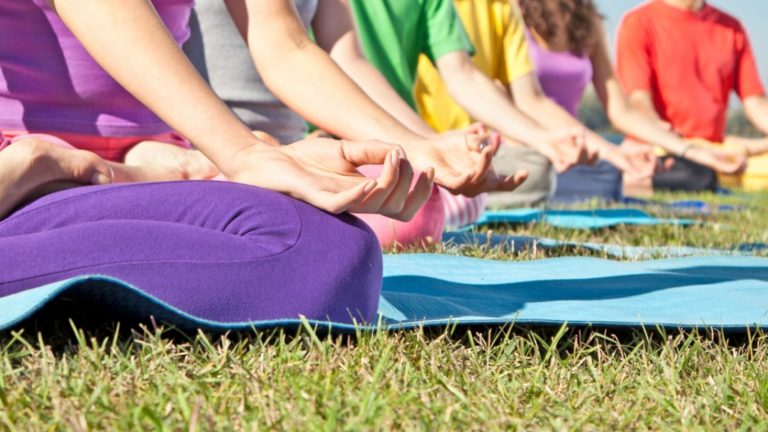How Do We Reconnect When Lonely?

Is Facebook making us lonely? In yogic terms one of the root causes of suffering is the perception of being alone. We think no one else feels what we feel, therefore no one else understands what we’re experiencing.
When our seventh chakra, the crown chakra, is blocked we feel lonely and disconnected. The work of this chakra is then to bring healing to the ailment of loneliness. For some, loneliness might have the literal meaning of being physically removed from other people. This seems to be a recent trend with the new obsessive emersion in social media. But feeling disconnected can have a deeper meaning and impact on your life, especially if it feels like you are living one never-ending groundhog’s day. Does your life have a feeling of futility?
What’s interesting is that in 1950, less than ten percent of American’s lived alone, but by 2010 nearly twenty-seven percent of households were occupied by only one person. There is a growing epidemic of loneliness. “We found that loneliness somehow penetrated the deepest recesses of the cell to alter the way genes were being expressed.” Loneliness affects not only the brain but also the basic process of DNA transcription. When your mind is lonely, your whole body is lonely. “Internet communication allows only ersatz intimacy. Forming connections with pets or online friends is a noble attempt to satisfy a compelling need, but surrogates can never make up completely for the absence of the real thing.” The real thing being actual people, in the flesh, as Stephen Marche explains.
Yoga and Community
Personally my favorite part of yoga has nothing to do with poses or breathing, but with community. It’s about the coming together of humans in all shapes, sizes, backgrounds, ages and interests, in the sharing of an experience. That’s why I go back every day, both as a student and a teacher. What’s more, it has been scientifically proven that being in a healthy community is good for us. The vibration of positively minded people raises our vibrational frequency.
This shared joy elevates our spirits and is even talked about in Yoga Sutra Chapter 2.33 Pratipaksha Bhavana. Essentially the sutras dictate that when we are imbalanced mentally, physically or emotionally, we are not living our true nature: Joy. Therefore, engaging with others and thinking happy thoughts helps us to create happiness both internally and externally. Positive energy creates and attracts more positive energy.
“Love creates a communion with life. Love expands us, connects us, sweetens us, and ennobles us. Love springs up in tender concern, it blossoms into caring action. It makes beauty out of all we touch. In any moment we can step beyond our small self and embrace each other as beloved parts of the whole.” – Jack Kornfield.
How Do We Reconnect?
First, you have to accept that we are all already continuously connected. All you have to do is open back up to our collective energy. This is referred to by scientists as the Zero Point Field, meaning that all matter is interconnected by one energy web. The easiest way to quiet the static that prevents us from feeling this, is meditation. Meditation creates a non-dualistic understanding of the world. It promotes the science of universal harmony. Meditation is a philosophy of supporting, rather than competing against, one another. It helps take away the feeling of threat and disconnection from the world. It promotes love as the eternal connector.
Dr. Dean Schrock describes meditation and explains why it works: *”Meditation allows you to access the quantum field of energy which is essentially a field of love. And meditation heals by leading you to love.” *
The true meaning of Namaste is: When I am in a place of love and you are in a place of love, we are one love.
Wishing you all the courage to open your hearts to greater community and collaboration. Love yourself, love your day, love your life.
How to Weather an Existential Crisis

There comes a time in the lives of many when there is a pause to reflect on the meaning of life. When this moment of Zen turns out to be especially troubling, puzzling, or even discombobulating, we have a name for it — an existential crisis. The symptoms of an existential crisis range from mild wonderment to turning your world on its head and it can feel much more extreme than a prolonged state of confusion or mental health issue.
There are numerous introductions into the potential rabbit hole of an existential crisis, but all of them usually begin with the question “Why am I here?” or “What is the meaning of life?” If you’re going through this, you aren’t alone.
Philosophers have contemplated the purpose of existence and existential anxiety all the way back through our collective past. Socrates had a prescription: “Know thyself.” The Indian sage Ramana Maharshi suggested asking, “Who am I?”
Why do we humans get caught up in this search for meaning, and why do we fear a meaningless life? Better yet, is there any meaning at all? Some people suggest there is a purpose to life that is bound to a sense of well-being, but the masters of enlightenment have long said that we are looking in the wrong direction — outward instead of inward.
Joseph Campbell taught that it’s better to stop searching for the meaning of life and to begin looking for the meaning in life. In other words, life deals us a certain hand of cards, and we need to find what makes us passionate about them. Campbell summed this up in three immortal words: “Follow your bliss” — and the philosopher Soren Kierkegaard said, “Don’t forget to love yourself.”





































